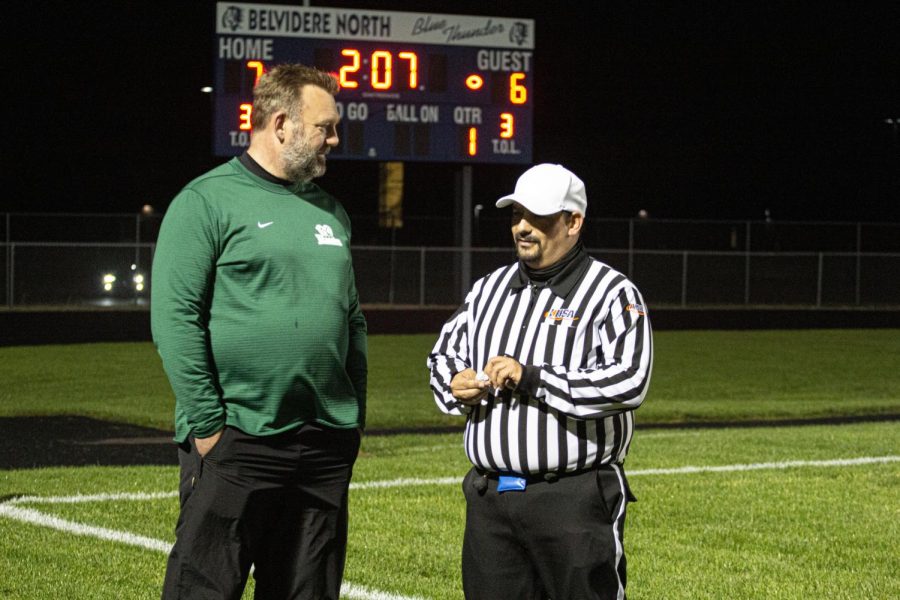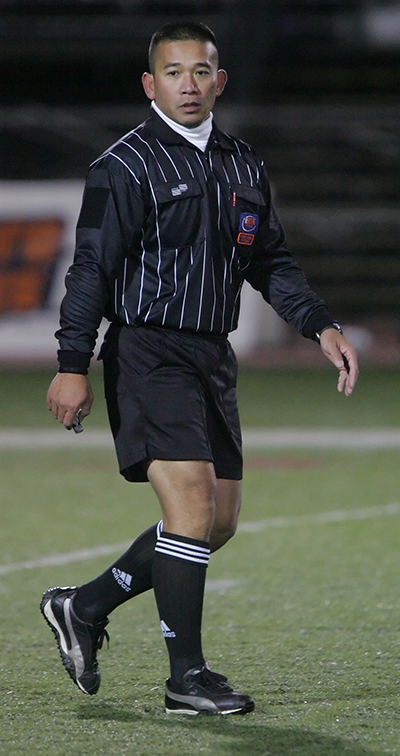Why You Should Be a Sports Official
Officiating is a necessary aspect of youth sports and a great way for you to get involved while building life skills and making some money.
If you have ever attended a sporting event or watched a professional sports broadcast, you can probably recognize the men and women who officiate contests at all levels of play. Whether they are behind the catcher in baseball, standing on the sideline, in basketball, or standing on the referee stand in volleyball, officials are everywhere in the sports we know and love.
 GCHS athletic director Brian Moe talks to the referee at a football game at Belvidere North on October 29, 2021. (Photo by Ian Cunningham)
GCHS athletic director Brian Moe talks to the referee at a football game at Belvidere North on October 29, 2021. (Photo by Ian Cunningham)In recent years, the Illinois High School Association (IHSA) has seen a dramatic decrease in participation from sports officials. The issue is widespread, and is affecting student athletes across the United States. The National Federation of High Schools (NFHS) has reported a loss of more than 50,000 officials since 2018. As the national high school sports community scrambles to secure officials for the spring season, student-athletes may be affected. Rules dictate that if a contest does not have a certified official it must be canceled or rescheduled. We could begin to see the effects of the shortage this spring season.
GCHS security guard and seven-year IHSA official, Brendan Kick said, “In terms of the shortage of officials, there is definitely an impact in terms of looking at freshmen level baseball. I know last year with COVID, it was a whole different situation. But the year prior, they were actually canceling freshmen games and lower-level games, because they didn’t have enough officials to cover the games…The lack of officials we have is really impacting our student athletes.”
 In 2020, IHSA awarded Sam Nachampassack “IHSA Official of the Year” in boys soccer. (Photo credit to IHSA)
In 2020, IHSA awarded Sam Nachampassack “IHSA Official of the Year” in boys soccer. (Photo credit to IHSA)Organizations like the IHSA and hundreds of youth sports leagues are looking for eligible people to step up and help keep youth sports running. There are different requirements for each level of officiating, but most youth sports leagues will accept high school-aged officials to start officiating youth league games. There are opportunities at many different levels and in almost all sports.
Besides supporting youth sports, there are many other reasons to get involved as an official. High school students in particular can benefit from the professionalism needed as an official. Officiating requires rules knowledge, quick decision making, and effective communication. As officials spend more time honing the craft, more opportunities for higher-level play will open up. If you already have officiating experience, you may consider becoming an IHSA official if you are 17 or more years old.
No matter how much you choose to officiate, there are countless opportunities to get involved. “There’s more games out there than there are officials to cover [them]. So whether it’s grade school feeder, park district on a Saturday, or any level of high school, there are games going on every night,” said Troy Whalen, GCHS baseball head coach and 24-year IHSA official.
Any experience in a sport could help get you started. Youth sports leagues and referee associations are always looking for officials to join. It is important to remember, however, that most officiating jobs are just that–jobs. Official associations, coaches, players, and fans are looking for responsibility and maturity out of their officials. The official plays a critical role in competitions, and upholding the integrity of the sport is an important aspect of officiating.
The Role of Umpire in Youth Baseball
When you talk about tough jobs, there are Navy SEALs and then there are baseball umpires. Okay okay, guilty of another exaggeration, no offense to our armed forces, thank you for your service! But seriously, the job of a baseball umpire requires an irrational devotion to the sport that often goes unnoticed and, dare we say, unrewarded. Being a youth baseball umpire takes work, dedication and fortitude, an unbeatable mind, and a very good eye. Here is what you can expect when you pull the cage over your face and start calling the shots.
ESSENTIAL DUTIES OF A YOUTH BASEBALL UMPIRE
You’ll want to get to the game early, at least about twenty or thirty minutes before, so that you can make the necessary inspections. Talk with the coaches, review ground rules and any field hazards or unusual circumstances. Inspect the players and make sure they are all in proper uniform, check all equipment and the field and report anything that’s amiss to the coaches. Avoid any contact with spectators, keep track of game time, and remain unbiased while running the game.
YOU CONTROL THE GAME’S ENVIRONMENT
That’s right, who starts and ends the game? Who officiates the whole affair, makes the judgements and enforces the rules? YOU DO! You are to be cool like Fonzie when you enter your domain. You’ve got your shoes shined and your official shirt, as well as the rest of your uniform, and you look spiffy, in shape and super professional. The respect for an umpire is created both on and off the field, you may be the only person on the field getting paid, so act like it!
KNOW THE RULES
If you don’t like opposition, umpiring is the wrong gig for you, because it is within baseball’s tradition to constantly question the umpire. Be prepared for everyone to yell at you, whether you are right or wrong. You may have to become “conveniently deaf”to focus on matters at hand. But above all, know your rules like the back of your hand, so that your calls are made swiftly and firmly with no hesitation. Be prepared to explain your decisions after the game is over, but don’t become embroiled in arguments that take away from the game.
LITTLE LEAGUE IS A BLOODSPORT
Remember how we told you that everyone is going to yell at you? What we really meant is that parents are going to yell at you when you strike out their pride and joy. Of course everyone is encouraged to honor the game. Nevertheless, it’s hard to keep your cool when you see someone’s parent climbing the chain link fence blowing smoke out of their nostrils. Always focus on the kids and being the best ambassador for little league possible. Do not lose your temper, because if you do, you lose control. You are an important part of the game, but you are never more important than the game.
KEEP YOUR EYE ON THE BALL
It’s a simple idea, keeping your eye on the ball, but it can be a challenge! Your vision needs to have laser-like precision for about three hours every game. Do everything you can to avoid interference with the ball, avoid being blocked out visually, give up distance to get the best angle to call a play. A batted ball can strike in a foul area and still become a fair ball. Wait for a full second before making a call, and never anticipate where the pitch is going. Phase out distractions, and politely remind any “assistants”that you are the umpire and you will make the calls. Also, those early season games can mean everyone’s arms are still wobbly and wily, pitchers aren’t in top form, and you probably aren’t either. You may get beaned by the ball, it’s cooler in the early season, and the sun goes down earlier making you feel frozen and blind by the end of the game. So don’t forget your scarf and always dress warmly enough.
BEING AN UMPIRE IS BEING A LONE WOLF
When you are the umpire, you are your own island, no one is on your side. You don’t get a break, you’re out there the entire time, freezing your butt off or roasting in your uniform with no chance to sit down every half inning. There’s no substitution for you if you’re not having such a great game. Umpires have bad days as well! You have to be top notch, and that’s why they say it’s lonely at the top.
Being an umpire has its challenges, you’ve got to make quick decisions under a lot of pressure and scrutiny, but it’s absolutely worth it. Where else do you get to be on a baseball field all the time being part of the game you love?


The Umpire meetings for 2025 are tentatively scheduled for Saturday May 10, 2025, at 3pm or 5pm. Any changes will be communicated here. Location of meeting is the BNBA office.
Below you will find the link to the Umpire Application. Please fill out the application and click on
the submit button. Submit your application no later than April 15, 2025.